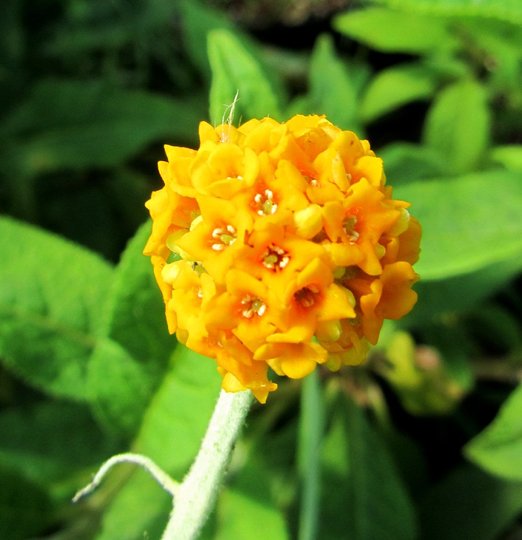West Midlands,
United Kingdom 
Buddleja globosa is in flower now in the UK. Has anyone grown the varieties LEMON BALL, CALLY ORANGE or the variegated form? Do you have a good close up photo of the flower you could share?
I am trying to make some sense of the varieties of this shrub and to identify their gender, although this is very difficult. Meanwhile here is a photo of a flower from a new plant with bright white stamens; normally they are orange and difficult to see. It's a male so I've called it Neville.

 12 Jun, 2014
12 Jun, 2014
Answers
That's pretty, isn't that a stigma [shiny green structure] in the middle though? or is it vestigial?
I wasn't aware that they were dioecious.
I used to have photos of globosa as I had a couple in the previous garden. They will be in a shoe box somewhere, I will have a look for you.
13 Jun, 2014
Yes, the stigma is most probably vestigial and structural. But the female flowers don't usually have visible stamens, which are very withered. It's never been documented in this species but a few other apparently dioecious Buddlejas from the Americas can have very occasional hermaphrodites (trioecious).
13 Jun, 2014
Ah they are cryptically dioecious. that explains it.
if hermaphrodite aren't they just a monoecious example? seems odd to give another name for what is a common flower arrangement.
13 Jun, 2014
Trioecious means a species with male, female and hermaphrodite individuals.
Monoecious usually means separate male and female flowers on the same individual, although it is often confusingly used for plants with hermaphrodite flowers.
Indeed B.globosa is cryptically dioecious, so cryptic it is hard to believe they aren't hermaphrodites.
13 Jun, 2014
I've not long planted one in the garden, a while away from flowering I think, or it was last time I checked. I'll be happy to take a shot for you as and when though.
I planted it to hide neighbour weeds until my replacement hedge grows.
13 Jun, 2014
I'm familiar with the mono/di terms but tri makes sense ie 3 forms on one plant. nothing like mother nature for complexities.
15 Jun, 2014


Can't answer your ? BJ but have to say Wow
13 Jun, 2014